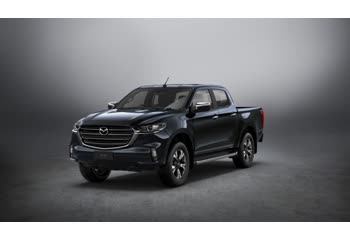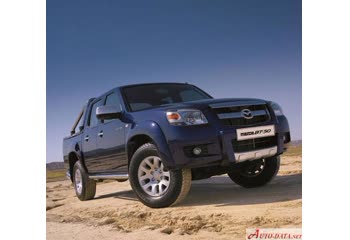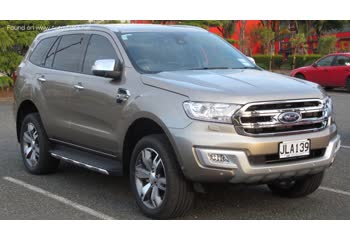Everything you need to know about specifications and performance - Mazda BT-50 2015 - XTR 3.2 (200 Hp) 4x4 Automatic

Overview:
What is the engine capacity of a Mazda BT-50 2015?
The engine capacity of the Mazda BT-50 2015 is 3198.
Mazda BT-50 2015 How many horsepower?
The engine power of the Mazda BT-50 2015 is 200 Hp @ 3000 rpm..
How much gasoline does a Mazda BT-50 2015 consume?
The Mazda BT-50 2015 consumes 9.2 liters of gasoline per 100 km
General:
Brand: Mazda
Model: BT-50
Generation: BT-50 Freestyle Cab II (facelift 2015)
Modification (Engine): XTR 3.2 (200 Hp) 4x4 Automatic
Start of production: 2015
End of production: 2018
Powertrain Architecture: Internal Combustion Engine
Body type: Pickup
Seats: 4
Doors: 4
Engine:
Power: 200 hp @ 3000 rpm.
Power per litre: 62.5 hp/l
Torque: 470 nm @ 1750-2500 rpm.
Engine displacement: 3198
Number of cylinders: 5
Engine configuration: Inline
Number of valves per cylinder: 4
Fuel injection system: Diesel Commonrail
Engine aspiration: Turbocharger, Intercooler
Valvetrain: DOHC
Engine oil capacity: 9.75 l
Coolant: 13.3 l
Engine layout: Front, Longitudinal
Cylinder Bore: 89.9 mm
Piston Stroke: 100.7 mm
Compression ratio: 15.5:1
Performance:
Fuel Type: Diesel
Fuel consumption (economy) - combined: 9.2 l/100 km
Emission standard: Euro 4
Weight-to-power ratio: 10.3 kg/Hp, 97.3 Hp/tonne
Weight-to-torque ratio: 4.4 kg/Nm, 228.6 Nm/tonne
Space:
Kerb Weight (kg): 2056
Max. weight (kg): 3200
Max load (kg): 1144
Permitted trailer load with brakes (12%): 3500 kg
Fuel tank capacity: 80 l
Permitted trailer load without brakes: 750 kg
Permitted towbar download: 350 kg
dimensions:
Ramp-over (brakeover) angle: 25.0°
Wading depth: 800 mm
Length: 5365 mm
Width: 1850 mm
Height: 1810 mm
wheelbase: 3220 mm
Front track: 1560 mm
Rear (Back) track: 1560 mm
Front overhang: 919 mm
Rear overhang: 1226 mm
Ride height (ground clearance): 205-237 mm
Minimum turning circle (turning diameter): 12.4 m
Approach angle: 28.2°
Departure angle: 26.4°
Powertrain, Suspension and Brakes:
Drivetrain Architecture: The Internal combustion Engine (ICE) drives permanently the four wheels of the vehicle.
Drive wheel: All wheel drive (4x4)
Number of gears and type of gearbox: 6 gears, automatic transmission
Front brakes: Ventilated discs, 302 mm
Rear brakes: Drum, 295 mm
Assisting systems: ABS (Anti-lock braking system)
Steering type: Steering rack and pinion
Power steering: Hydraulic Steering
Tires size: 265/65 R17 112T
Wheel rims size: 7.5J x 17; 8.0J x 17
Front suspension: Double wishbone
Rear suspension: Leaf Spring
See also

Last generation.
Its production began in 2020 until Now

Other generation.
Its production began in 2006 until 2008

Other generation.
Its production began in 2015 until 2018

Same production year and almost the same engine capacity.
Its production began in 2015 until 2018

Same production year and almost the same engine capacity.
Its production began in 2015 until 2018

Write a comment